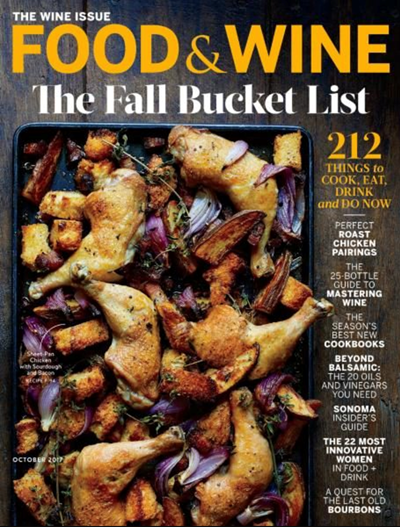A cookbook editor’s take on the Food & Wine move
November 22, 2017 by Darcie In June
we learned that Food & Wine magazine was moving the bulk of its operation to Birmingham,
Alabama. Even though it came as a bit of a surprise, most people
like food writer Ruth Reichl understood the reasons for the
relocation and viewed it in a positive light – at least the
publication wasn’t shuttering like many others. James Beard
Award-winning cookbook editor Shaun Chavis doesn’t share this
optimism, however, She writes that the move is not good for America.
In June
we learned that Food & Wine magazine was moving the bulk of its operation to Birmingham,
Alabama. Even though it came as a bit of a surprise, most people
like food writer Ruth Reichl understood the reasons for the
relocation and viewed it in a positive light – at least the
publication wasn’t shuttering like many others. James Beard
Award-winning cookbook editor Shaun Chavis doesn’t share this
optimism, however, She writes that the move is not good for America.
Chavis’ main argument is that the cultural attitudes in the magazine’s new location do not reflect the growing diversity in the United States. She notes that while Food & Wine’s sister publications have made small moves toward representing a broader range of people, magazines like Southern Living still don’t feature many people of color in its pages. This is despite the fact the 55 percent of black Americans live in the South, and both Hispanic and Asian-American populations are growing rapidly there.
The lack of diversity is reflected in Birmingham’s food scene, which is not remotely comparable to cities like New York, the magazine’s former home. Says Chavis, not only will Food & Wine be produced in an area where specialty ingredients are difficult to find – making it harder to do testing and development of recipes from a broad range of cultures – the region’s attitudes will also stifle diverse voices. Says Chavis, “The restaurant concepts, flavors, and dishes found in a city of immigrants like New York aren’t present in an environment that has produced one of the nation’s most unfriendly environments toward people who aren’t wealthy WASP men.”
Although she does not view this move favorably, Chavis thinks that Time, Inc. (Food & Wine’s parent company) can move the magazine in a positive direction. She implores the company to “Show America’s diversity as its strength in more ways than one. Use food to help lead our culture to a better place.”
Categories
- All Posts (6940)
- Antipasto (2135)
- Author Articles (247)
- Book News (935)
- Cookbook Giveaways (983)
- Cookbook Lovers (257)
- Cooking Tips (109)
- Culinary News (299)
- Food Biz People (552)
- Food Online (791)
- Holidays & Celebrations (272)
- New Cookbooks (149)
- Recipes (1500)
- Shelf Life With Susie (231)
- What's New on EYB (133)
Archives
Latest Comments
- Atroyer7 on Danube Cookbook Review and Giveaway
- demomcook on What foods do you look forward to the most for each season?
- demomcook on Danube Cookbook Review and Giveaway
- Darcie on How cookbooks can help build resilience
- mholson3 on Danube Cookbook Review and Giveaway
- Rinshin on How cookbooks can help build resilience
- sarahawker on Danube Cookbook Review and Giveaway
- Sand9 on Danube Cookbook Review and Giveaway
- hankintoby29 on Heritage Cookies of the Mediterranean World – Cookbook Giveaway
- WBB613 on Feasts of Good Fortune Cookbook Giveaway